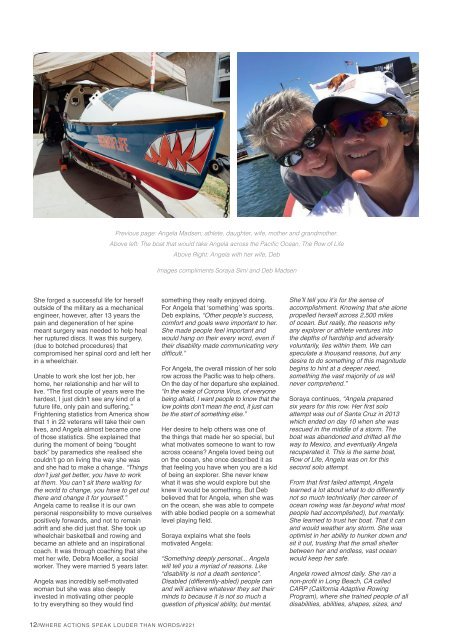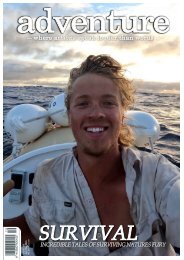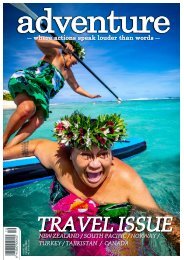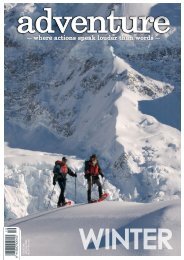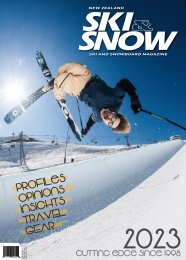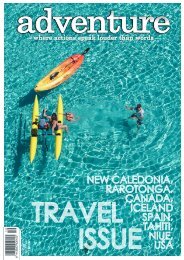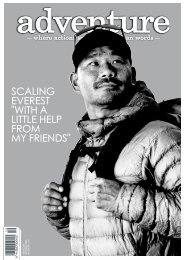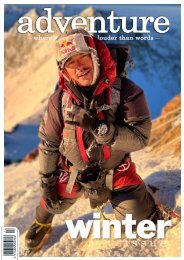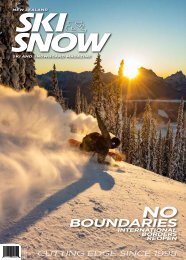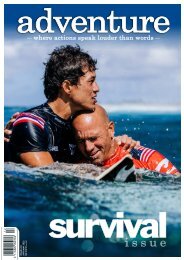Adventure Magazine Issue 221
Women's issue of Adventure
Women's issue of Adventure
Create successful ePaper yourself
Turn your PDF publications into a flip-book with our unique Google optimized e-Paper software.
Previous page: Angela Madsen; athlete, daughter, wife, mother and grandmother.<br />
Above left: The boat that would take Angela across the Pacific Ocean, The Row of Life<br />
Above Right: Angela with her wife, Deb<br />
Images compliments Soraya Simi and Deb Madsen<br />
ages in rowing. She had a Concept2 rowing<br />
machine which, at night, since she couldn’t<br />
sleep more for two hours at a time from pain<br />
in her back, she would wake up and row.<br />
This mimicked the sleep and work schedule<br />
at sea, as she rowed for two hours on, two<br />
hours off, repeatedly, everyday.”<br />
The idea of being alone in the middle of the<br />
ocean, miles from land, would make many<br />
of us fearful. However, Angela did her best<br />
to mitigate those fears with knowledge and<br />
preparedness.<br />
Soraya explains.<br />
“Angela was scared lots of times, but her<br />
incredible ability to reframe her mindset<br />
and handle what was thrown at her, is,<br />
as Angela puts it, a result of getting a lot<br />
of practice. Angela used to say that she<br />
wasn’t scared but Deb once pointed out<br />
after Angela was speaking to a group of<br />
kids about what she does that it wasn’t right<br />
to paint an inaccurate picture of the sheer<br />
vulnerability one faces out there, alone.<br />
Any water person knows that you are not<br />
in control. How you respond to the chaos<br />
and unpredictability of the elements is what<br />
dictates your survival. Nature is wholly<br />
indifferent and has no agenda."<br />
Angela enjoyed being alone on the crossing,<br />
but she did have the technology that allowed<br />
her to share her journey with people through<br />
text messages and satellite phone calls<br />
so she was rarely lonely. As for the fear<br />
of getting lost, Deb explains, “with GPS<br />
technology and tracking, getting lost is not<br />
easy. You may not always be going where<br />
you want to go, but you’re never lost.”<br />
It would be impossible to row for any<br />
period of time without experiencing a<br />
storm. However the ocean rowing boats<br />
are designed to self-right if they capsize in<br />
a storm and are made to sustain life while<br />
at sea. It wouldn’t suit all of us but Angela<br />
seemed to delight at being so close to the<br />
weather and maybe that’s one of the things<br />
she loved about ocean rowing.<br />
In the same way that Angela ‘delighted’<br />
in facing the storms in her boat, she also<br />
thrived facing the storms that life threw<br />
at her. Throughout her extraordinary life,<br />
Angela revealed the amazing personality<br />
and qualities that have become her legacy.<br />
Angela not only overcame her challenges,<br />
but they became a podium for her to reach<br />
out to others and reveal the amazing<br />
woman; daughter, mother, grandmother, wife<br />
and friend, that she was.<br />
Above: Angela in her days with the<br />
Marine Corp.<br />
Below: Angela, alone on the ocean<br />
She forged a successful life for herself<br />
outside of the military as a mechanical<br />
engineer, however, after 13 years the<br />
pain and degeneration of her spine<br />
meant surgery was needed to help heal<br />
her ruptured discs. It was this surgery,<br />
(due to botched procedures) that<br />
compromised her spinal cord and left her<br />
in a wheelchair.<br />
Unable to work she lost her job, her<br />
home, her relationship and her will to<br />
live. “The first couple of years were the<br />
hardest, I just didn’t see any kind of a<br />
future life, only pain and suffering.”<br />
Frightening statistics from America show<br />
that 1 in 22 veterans will take their own<br />
lives, and Angela almost became one<br />
of those statistics. She explained that<br />
during the moment of being “bought<br />
back” by paramedics she realised she<br />
couldn’t go on living the way she was<br />
and she had to make a change. “Things<br />
don’t just get better, you have to work<br />
at them. You can’t sit there waiting for<br />
the world to change, you have to get out<br />
there and change it for yourself.”<br />
Angela came to realise it is our own<br />
personal responsibility to move ourselves<br />
positively forwards, and not to remain<br />
adrift and she did just that. She took up<br />
wheelchair basketball and rowing and<br />
became an athlete and an inspirational<br />
coach. It was through coaching that she<br />
met her wife, Debra Moeller, a social<br />
worker. They were married 5 years later.<br />
Angela was incredibly self-motivated<br />
woman but she was also deeply<br />
invested in motivating other people<br />
to try everything so they would find<br />
12//WHERE ACTIONS SPEAK LOUDER THAN WORDS/#<strong>221</strong><br />
something they really enjoyed doing.<br />
For Angela that ‘something’ was sports.<br />
Deb explains, “Other people’s success,<br />
comfort and goals were important to her.<br />
She made people feel important and<br />
would hang on their every word, even if<br />
their disability made communicating very<br />
difficult.”<br />
For Angela, the overall mission of her solo<br />
row across the Pacific was to help others.<br />
On the day of her departure she explained.<br />
“In the wake of Corona Virus, of everyone<br />
being afraid, I want people to know that the<br />
low points don’t mean the end, it just can<br />
be the start of something else.”<br />
Her desire to help others was one of<br />
the things that made her so special, but<br />
what motivates someone to want to row<br />
across oceans? Angela loved being out<br />
on the ocean, she once described it as<br />
that feeling you have when you are a kid<br />
of being an explorer. She never knew<br />
what it was she would explore but she<br />
knew it would be something. But Deb<br />
believed that for Angela, when she was<br />
on the ocean, she was able to compete<br />
with able bodied people on a somewhat<br />
level playing field.<br />
Soraya explains what she feels<br />
motivated Angela:<br />
“Something deeply personal... Angela<br />
will tell you a myriad of reasons. Like<br />
“disability is not a death sentence”.<br />
Disabled (differently-abled) people can<br />
and will achieve whatever they set their<br />
minds to because it is not so much a<br />
question of physical ability, but mental.<br />
She’ll tell you it’s for the sense of<br />
accomplishment. Knowing that she alone<br />
propelled herself across 2,500 miles<br />
of ocean. But really, the reasons why<br />
any explorer or athlete ventures into<br />
the depths of hardship and adversity<br />
voluntarily, lies within them. We can<br />
speculate a thousand reasons, but any<br />
desire to do something of this magnitude<br />
begins to hint at a deeper need,<br />
something the vast majority of us will<br />
never comprehend.”<br />
Soraya continues, “Angela prepared<br />
six years for this row. Her first solo<br />
attempt was out of Santa Cruz in 2013<br />
which ended on day 10 when she was<br />
rescued in the middle of a storm. The<br />
boat was abandoned and drifted all the<br />
way to Mexico, and eventually Angela<br />
recuperated it. This is the same boat,<br />
Row of Life, Angela was on for this<br />
second solo attempt.<br />
From that first failed attempt, Angela<br />
learned a lot about what to do differently<br />
not so much technically (her career of<br />
ocean rowing was far beyond what most<br />
people had accomplished), but mentally.<br />
She learned to trust her boat. That it can<br />
and would weather any storm. She was<br />
optimist in her ability to hunker down and<br />
sit it out, trusting that the small shelter<br />
between her and endless, vast ocean<br />
would keep her safe.<br />
Angela rowed almost daily. She ran a<br />
non-profit in Long Beach, CA called<br />
CARP (California Adaptive Rowing<br />
Program), where she trained people of all<br />
disabilities, abilities, shapes, sizes, and<br />
“People say I was born with a<br />
resilient trait but it’s just that<br />
I’ve had more opportunities<br />
to practise. Everyone in the<br />
world is capable of resilience<br />
and adversity and overcoming<br />
challenges and some of us are<br />
just more practised at it.”<br />
Soraya still has every intention of completing the film to memorialize Angela's legacy and share her story of her last row<br />
at sea. To stay updated on its progress, follow along at @rowoflife on Instagram.


